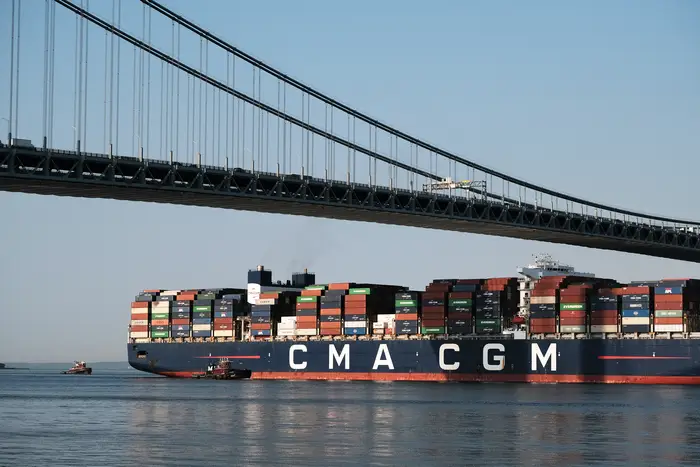With virtually no time left before a strike deadline, unionised dockworkers are hearing their fate. Represented by the International Longshoremen’s Association (ILA), the 45,000 dockworkers across the US, from Maine to Texas, are negotiating with the U.S. Maritime Alliance over raise in wages and degree of automation. Starting as early as 1 October, they could shut down popular ports up and down the country. With a nationwide port strike, a lull in the US supply chain is up next. Not only will delivery times increase, prices will rise and an abundance of goods for the holiday season such as toys and perishables like bananas will be in short supply.
The US Maritime Alliance, which represents 36 ports, offered an almost 50 per cent pay raise over six years, a tripling of employer contributions to pension plans, an expansion of health benefits and a continuation of limits on automation. But the union has demanded a 77 per cent pay raise over the same period, based on inflation, as well as an outright ban on automation of cranes, gates and container-moving trucks – issues still unresolved in talks that began this January.
The last ILA Walkout took place in 1977, and the upcoming strike, if it occurs, would be the first since then. If it goes forward, the economic fallout could be disastrous, especially as ports on the East and Gulf Coasts move some 50 per cent of all U.S. ship cargo, including vital goods. According to the American Farm Bureau Federation, 75 per cent of the nation’s banana supply, about 3.8 million metric tons, moves through East and Gulf Coast ports each year. Retailers also fear the ripple effect of any walkout on holiday shopping could result in product shortages and dramatic hikes on everything from artificial Christmas trees to cars and coffee.
Political Implications and Biden’s Response
The situation has involved the president’s administration at close range. But so far, Biden has declined to use the presidential authority he could exert under the 1947 Taft-Hartley Act that, for example, could order a cooling-off period. It is only weeks now before the 2024 presidential election. Any economic disruption could tip the balance. Might this strike be a fake crisis that will boost the vice president Kamala Harris, and give her the opening to take the political credit if the situation is averted? With the economy and inflation high on voter concerns, a strike could create chaos right as people walk into the polling booths.
Biden may be wisely keeping himself out of the fray in the hopes that a deal is struck, then letting Harris step in if and when a deal is reached, presenting herself as a problem-solver on the national stage). In the meantime, the White House has been trying to work the phones to bring about an end. President Biden’s chief of staff Jeff Zients and the head of the National Economic Council hosted a meeting with. The administration is urging a swift settlement that takes into account the stellar performance of the giant shipping companies recently, while rewarding the wages and working conditions of the ILWU workers who have worked for less than what the companies are earning.
Economic Repercussions of a Strike
A long strike at the ports could cause significant economic ripples, especially as retailers prepare for the upcoming holiday season. Many retailers rely on a steady stream of imports during this critical time of year, and any hiccups could mean bare shelves, lost sales and rising costs. The ripple effects of the frustration at the ports could extend into 2025, as the worldwide supply chain struggles to right itself, says Jay Dhokia, an expert in supply chain management at the University of Southern California’s Marshall School of Business. That would be bad news for the rest of the world, since the US imports and exports huge amounts of goods all over the globe. Our chief trading partner, the United Kingdom, could suffer due to delayed imports and shortages of products from the US due to shutdowns of US ports, for example.
‘A shipper is going to get a penalty on his delivery. With perishable items like fruit, they might spoil before they even get in the store. It’s going to be hard for customers. It’s a huge thing for business.’ Indeed, the ILA’s call for an automation ban is a sticking point in negotiations. Dockworkers fear losing jobs to the machinery that’ ports running safely and efficiently. Local 1439 has declared its ‘firm and absolute opposition to any form of automation at the port of Houston’. Sooner or later, however, the alliance argues that some automation is inevitable if the port is to compete with other major terminals around the world.
Can a Resolution Be Reached in Time?
Even so, after several days of private negotiations, each side has moved from its opening offer and, at least in public, both seem to have hope of a settlement before the 28 July strike deadline. The US Maritime Alliance’s latest offer includes a salary increase, enhanced benefits in retirement and healthcare – a package they believe ‘will meet the union’s needs’. The U.S. Maritime Alliance’s revised offer includes a larger pay rise, better benefits in retirement and healthcare – something they believe will meet the union’s needs, but without an agreement on automation, the call for a strike remains.
Will a strike affect the broader economy and can political leaders limit the economic fallout? If there is a last-minute agreement to avoid a strike, the vice president Kamala Harris might be able to discredit future claim that she ‘broke’ the rail strike and averted a national crisis. Presiding over a successful resolution could provide her with a late entry into the 2024 election. If the strike drags on, economic disruption could undermine Biden’s handling of the economy, which in turn could cost him the polls.
Manufactured Crisis?
Why might such a crisis emerge now? The impending election raises concerns that the strike is being either used or allowed to get extremely bad to benefit the Democratic ticket. If Harris swoops in to save the day and broker a deal at the last minute, she could come across looking like a hero who saved the nation from economic catastrophe. Alternatively, an extended strike could have disastrous economic effects that the Republicans could seize upon in their claims that the Biden administration has been unable to manage inflation and supply chain issues.
Political prognosticators will carefully monitor how this plays out. If there is a peaceful resolution with minimal economic disruption, it could bode well for the Biden-Harris ticket. But if the strike drags on, disrupting operations across the country, the administration will likely be held accountable for failing to avert the crisis.
With the clock ticking down to a strike deadline, everyone’s keeping a close watch on the contract negotiations currently underway between the International Longshoremen’s Association (ILA) and the U.S. Maritime Alliance. A Labour Day walkout at 36 ports up and down the East and Gulf Coasts, from Maine to Texas, could hobble the US economy, trigger massive supply chain disruptions, send prices soaring, and delay truckloads of holiday merchandise around the country. If the labour impasse continues into a work stoppage, it would be the first major strike the ILA has conducted since 1977 – and the impacts would be felt far and wide, in the lives of millions of Americans and thousands of companies reliant on the flow of goods through the country’s prized port system.
Political considerations are also at play. A prolonged strike would threaten the Biden administration, which is already facing backlash over inflation and economic management. Biden has stated that he will not invoke Taft-Hartley to mandate an 80-day stay on the strike, and he insists he will not cross a picket line. However, a hands-off approach could easily backfire if the economic damage grows uncontrollable. Conversely, if negotiations are successful and a deal is brokered, a key political opportunity could present itself to Harris if she is seen as a pivotal actor in ending the crisis and stepping in to help broker the deal. This could serve as a political boost for her ahead of the 2024 presidential election.
With economics and politics on the line, it’s going to be a crucial few days. Companies, consumers and voters are bracing for the fallout, and depending on the outcome, where these negotiations end up, the ramifications will be felt up and down the supply chain – from the docks to the boardroom, dinner table and ballot box.
Stay up to date on the latest, and go to The New York Times and The Washington Post.

